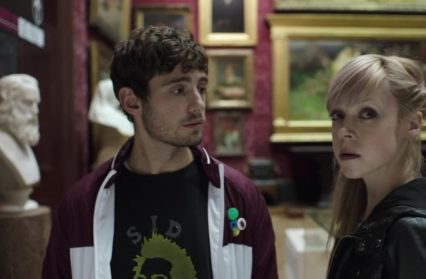Jim Morphy reviews Kelly + Victor, a Liverpudlian love story directed by Kieran Evans and documenting the eponymous couple’s often volatile romance.
The young and beautiful Kelly (Antonia Campbell-Hughes) and Victor (Julian Morris) stare in wonder at Alfred Gilbert’s ‘Death, the Door to Life’ on show at the Walker Art Gallery, Liverpool. This funerary monument captures the devotion to each other of a husband and wife. Eternal love, bliss, contentment.Things for a young couple to dream of.
But, even by the time of this scene, we know that this is too much for them to expect. Things will not end well for Kelly and Victor. This is a love story, make no mistake, but this is no ordinary love story. Each will get their own highs, but not the comfortable highs that go with everlasting union.
Welshman Kieran Evans – best-known for his music documentaries and videos – has adapted Niall Griffiths’s dark novel of sexual obsession and urban angst for his first foray into the world of feature films. Evans emerges as a film-maker of real talent. Kelly + Victor is a strong and important piece of work. But it is not without its flaws.
The opening scene finds shop assistant Kelly and scrapyard worker Victor locking eyes across the dancefloor. With little messing about, they’re soon heading to her flat and she’s telling him that sex between people of their star signs can be horrible or fucking amazing. Of course, it can be both. And it will be.
Evans’s film tracks the couple’s relationship from that joyous first encounter as things between them get more intense, particularly so in the bedroom.
The film is at its best – the film truly matters – in its exploration of the dark edges of sexual experience (or strong kinky sex, as the title-card warning wonderfully puts it). Bondage, sadomasochism, autoerotic asphyxiation, it’s all here.
Evans has said: ‘Sex seems to be the last taboo subject that’s finally getting discussed and filmed in the right way – it’s not just a bunch of Hollywood actors pushing each other up against the fucking wall and hiking their skirts up, doing these mad sex scenes on glass tables anymore. It’s a legitimate subject to discuss.’ Kelly + Victor follows works such as Shame (2011), Blue Valentine (2010), 9 Songs (2004), Secretary (2002), The Piano Teacher (2001) and Crash (1996) in presenting interesting takes on this final taboo (one of many final taboos, that is).
Around the scenes of the couple’s developing relationship, Evans gives us vignettes taken from their everyday lives as well as a vivid portrait of the city of Liverpool. These subplots and diversions are pulled off to varying degrees of success.
We see the characters’ personal difficulties – such as her abusive ex-partner and his getting laid off from work – that may or may not help explain their search for heightened sexual experience. Certainly, these scenes succeed in giving a sense of the lives of casual labour, tight friendships and drug-fuelled kicks led by many living in urban areas.
The tone of the different threads varies awkwardly. In particular, some of the middle scenes as the two socialise with each other and with friends are surprisingly limp. And Victor’s trip to the countryside for a small-time drugs deal is part played-for-laughs and part strange spiritual-odyssey.
The way Victor’s connection to nature, and the sense of transcendence it brings him, is stretched to suggest parallels with his darker urges doesn’t fully work. And Evans’s injection of his own passions for city portraiture and music (as previously seen in his work with Saint Etienne), while often beautiful in itself, can feel heavy-handed and, at times, superfluous. One can’t help but wish Evans had gone full throttle in focusing on the dark core of the story. There’s just a tad too much tame filler for this to be the blacker than black film it could have, and perhaps should have, been.
Both leads deserve praise. Antonia Campbell-Hughes gives a brilliant, raw performance as the unknowable Kelly – the more damaged, and the more interesting, of the lead characters. Julian Morris impresses, but is a little too neat for Victor. His character comes across as more innocent than the Victor of the book. In fact, their relationship doesn’t fully convince in its ‘soppy love’ aspects. But, that’s perhaps the point: these characters have sides to them that are impossible to fathom.
Kieran Evans has spoken of his admiration for Nicolas Roeg, the director of Don’t Look Now (1973). The influence shows, not least in the fractured narrative and the smart editing of the sex scenes. Although, tellingly, the sex is spliced not with a couple getting dressing in a posh hotel, but with a couple snorting lines and drinking liquor from mugs. The judicious use of the colour red (Kelly trying on a red coat, and her dangerous use of red material in the bedroom) also brings to mind Roeg.
This Film Agency of Wales-supported film brings us an exciting talent in Kieran Evans. It also reminds us of the brilliance of Aberystwyth-resident Niall Griffiths (who has a cameo in the film – suitably, he’s propping up a bar). Plaudits are deserved all around. Kelly + Victor is a film that deserves attention.
Note:
The Kieran Evans quote in this review is taken from The Skinny’s interview with the director, which is available here:
http://www.theskinny.co.uk/film/features/305730-dark_passion_kieran_evans_kelly_victor












